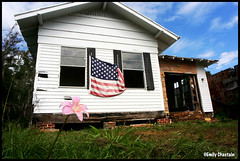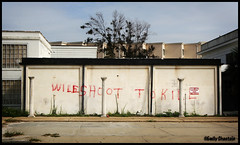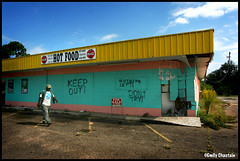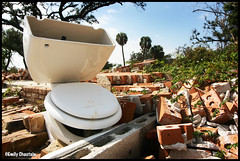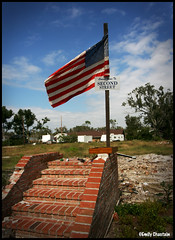I was inspired by Steve to write this post. Books are something I've always enjoyed and never minded talking about. My hope is if I write about them in this pre-formatted list form, then I will somehow seem like less of a nerd and people will think it's cool. (That is the point of these things, right?)
A book that didn't change my life: The Purpose Driven Life by Rick Warren. Perhaps my expectations were too high, or my motivation was too low. I guarantee you it changed Warren's life though.
A book I’ve read more than once: My Name is Asher Lev by Chaim Potok. One of my all-time favorites. It gets better every time I read it.
A book I would take with me if I were stuck on a desert island: SAS Survival Handbook: How to Survive in the Wild, in Any Climate, on Land or at Sea by John Wiseman. I've never read it, but I'm thinking a desert island would be the prime place to start.
A book that made me laugh: Me Talk Pretty One Day by David Sedaris. If you've never read Sedaris, you've been missing out. He's genuinely funny, unlike a bunch of authors who just pretend to be. The recent trend seems to show that growing up homosexual in a disfunctional family situation will somehow make you funny. Or totally screwed up. Or maybe they're synonymous. (Read Running with Scissors by Augusten Burroughs if you don't believe me.)
A book that made me cry: The Kite Runner by Khaled Hosseini. I bawled. 'Nuff said.
A book that I wish I had written: Breathing Lessons by Anne Tyler. If I were a novelist, I would want my style to most closely resemble Tyler's. It's real without being pretentious, it's interesting without being far-fetched, and it's extraordinary while still being ordinary.
A book that I wish had never been written: Can I pick two for this? I'm still bitter about these books being on "everyone's reading list" in school. I would burn them and not look back. A Tree Grows in Brooklyn by Betty Smith and A Separate Peace by John Knowles. Don't even try to defend them. I know what you're thinking, "But they're brilliant coming-of-age novels." No, I think they suck.
A book I’ve been meaning to read: The Problem of Pain by C.S. Lewis. I finished Mere Christianity and thought it was phenomenal so I'm expecting great things from this one too.
I’m currently reading: At Home in the Heart of Appalachia by John O'Brien. Since I live at home in the heart of Appalachia, I thought it was only fitting to read about it. So far, not too enlightening.
Sunday, November 12, 2006
Sunday, November 05, 2006
A collection of thoughts written during my visit to Gulfport, Mississippi
I sit down to write at the old lift-top wooden desk, the same desk my father used once upon a time. It's a desk that calls the boys room home - the room my brother and I stay in when we visit and the room my father and his brother at one time shared. There are remnants of their childhood here: an assortment of foreign currency framed and hanging on the wall, a musical instrument oddly resembling a wooden shoe with a handle and pegs, brass knuckles buried at the bottom of a dresser drawer. The desk I sit at bears scars from aged pencil stabs and slices, worn corners and a slight wobble. This desk, this room, this house on Kendall Avenue - they have a history. It's the history of a family, a story of 4 lifetimes - a delicate inheritance passed down to me through dinner table stories, dusty drawers full of treasure, and timeless tradition.
It's my history, too.
I think these things as I sit at the desk to write, my parents breathing contented sounds of heavy sleep in the next room, my grandparents in separate beds now, sleeping in the best positions they know how.
History builds a place, anchors and roots it.
And now it's gone for so many people. This town has suffered immense loss in the last year, but more than the houses, more than the casinos, more than the fishing boats and souvenir shops, this town has lost history. I almost feel insulted personally as I drive past places I've frequented for years, now utterly destroyed. The devastation is immense, and nearly unimaginable an entire year later. It has been 14 months since Hurricane Katrina, and I am appalled by the amount left undone. I drive past countless homes, boarded up and unlivable, with small trailers parked in front yards. FEMA trailers, I'm told, for those lucky names on the list that actually got one. The trailers are everywhere, literally sitting in the middle of halfway cleared now-empty lots.
People here, they are now defined by the hurricane. It's a clean sharp-blade cut through the fabric of their lives. Two separate pieces, divided into "before Katrina" and "since Katrina." Life goes on, but it's different now. There is nowhere to go, no corner to turn where the devastation isn't evident. There's no way to ignore it, and no chance at forgetting it. Acceptance is the most prevalent approach at this point, laced with guarded hope and the occasional bitter sense of humor. "Camille was a lady, but Katrina was a bitch" reads one bumper sticker, referring to the 1969 category 5 hurricane that also wreaked much havoc on the Gulf Coast. Katrina was the true bitch, though, destroying or majorly damaging over 90% of the structures within a half-mile of the coastline. Katrina also ranks as the costliest natural disaster to ever occur in the U.S.
But there's hope, too. Hope for a new history, a second-chance timeline of reconstruction and future. I see it in the countless "now open" signs printed on plastic banners and hung proudly across storefronts and restaurants. I see it in the lives of the teenagers tossing a football back and forth along the almost clean beach. And I see it in my grandparents who drive us 30 miles to eat at a newly-relocated previously-beachfront seafood restaurant.
I hope for a new history for the people of the Gulf Coast. It won't happen quickly, and it won't ever be the same. But I think time is probably history's best friend.
************************************************************
A lone flower grows in the yard of an abandoned house on Second Street in Gulfport, Miss. The utter destruction caused by Hurricane Katrina was far greater than I ever could have imagined, even more than a year later. Katrina ranks as the costliest natural disaster to ever occur in the U.S. It is estimated that over 90% of the structures within a half-mile of the coastline were destroyed.
A spray-painted message is still visible on the side of a destroyed and damaged abandoned building in Gulfport, Miss.
A man walks past another abandoned building bearing spray-painted messages to tresspassers in Gulfport, Miss.
What was once a home is now a pile of rubble along the beach in Gulfport, Mississippi.
A staircase leads to nowhere at a destroyed homesite on Second Street in Gulfport, Miss.
It's my history, too.
I think these things as I sit at the desk to write, my parents breathing contented sounds of heavy sleep in the next room, my grandparents in separate beds now, sleeping in the best positions they know how.
History builds a place, anchors and roots it.
And now it's gone for so many people. This town has suffered immense loss in the last year, but more than the houses, more than the casinos, more than the fishing boats and souvenir shops, this town has lost history. I almost feel insulted personally as I drive past places I've frequented for years, now utterly destroyed. The devastation is immense, and nearly unimaginable an entire year later. It has been 14 months since Hurricane Katrina, and I am appalled by the amount left undone. I drive past countless homes, boarded up and unlivable, with small trailers parked in front yards. FEMA trailers, I'm told, for those lucky names on the list that actually got one. The trailers are everywhere, literally sitting in the middle of halfway cleared now-empty lots.
People here, they are now defined by the hurricane. It's a clean sharp-blade cut through the fabric of their lives. Two separate pieces, divided into "before Katrina" and "since Katrina." Life goes on, but it's different now. There is nowhere to go, no corner to turn where the devastation isn't evident. There's no way to ignore it, and no chance at forgetting it. Acceptance is the most prevalent approach at this point, laced with guarded hope and the occasional bitter sense of humor. "Camille was a lady, but Katrina was a bitch" reads one bumper sticker, referring to the 1969 category 5 hurricane that also wreaked much havoc on the Gulf Coast. Katrina was the true bitch, though, destroying or majorly damaging over 90% of the structures within a half-mile of the coastline. Katrina also ranks as the costliest natural disaster to ever occur in the U.S.
But there's hope, too. Hope for a new history, a second-chance timeline of reconstruction and future. I see it in the countless "now open" signs printed on plastic banners and hung proudly across storefronts and restaurants. I see it in the lives of the teenagers tossing a football back and forth along the almost clean beach. And I see it in my grandparents who drive us 30 miles to eat at a newly-relocated previously-beachfront seafood restaurant.
I hope for a new history for the people of the Gulf Coast. It won't happen quickly, and it won't ever be the same. But I think time is probably history's best friend.
************************************************************
A lone flower grows in the yard of an abandoned house on Second Street in Gulfport, Miss. The utter destruction caused by Hurricane Katrina was far greater than I ever could have imagined, even more than a year later. Katrina ranks as the costliest natural disaster to ever occur in the U.S. It is estimated that over 90% of the structures within a half-mile of the coastline were destroyed.
A spray-painted message is still visible on the side of a destroyed and damaged abandoned building in Gulfport, Miss.
A man walks past another abandoned building bearing spray-painted messages to tresspassers in Gulfport, Miss.
What was once a home is now a pile of rubble along the beach in Gulfport, Mississippi.
A staircase leads to nowhere at a destroyed homesite on Second Street in Gulfport, Miss.
Subscribe to:
Comments (Atom)

